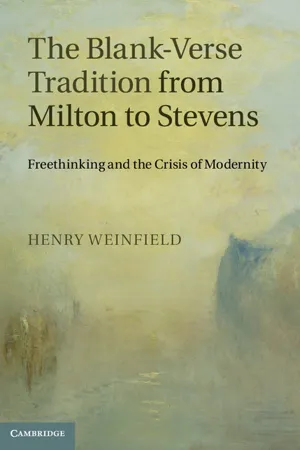
The Blank-Verse Tradition from Milton to Stevens
Freethinking and the Crisis of Modernity
- English
- PDF
- Available on iOS & Android
The Blank-Verse Tradition from Milton to Stevens
Freethinking and the Crisis of Modernity
About this book
Blank verse, unrhymed iambic pentameter, has been central to English poetry since the Renaissance. It is the basic vehicle of Shakespeare's plays and the form in which Milton chose to write Paradise Lost. Milton associated it with freedom, and the Romantics, connecting it in turn with freethinking, used it to explore change and confront modernity, sometimes in unexpectedly radical ways. Henry Weinfield's detailed readings of the masterpieces of English blank verse focus on Milton, Wordsworth, Shelley, Keats, Tennyson and Stevens. He traces the philosophical and psychological struggles underlying these poets' choice of form and genre, and the extent to which their work is marked, consciously or not, by the influence of other poets. Unusually attuned to echoes between poems, this study sheds new light on how important poetic texts, most of which are central to the literary canon, unfold as works of art.
Frequently asked questions
- Essential is ideal for learners and professionals who enjoy exploring a wide range of subjects. Access the Essential Library with 800,000+ trusted titles and best-sellers across business, personal growth, and the humanities. Includes unlimited reading time and Standard Read Aloud voice.
- Complete: Perfect for advanced learners and researchers needing full, unrestricted access. Unlock 1.4M+ books across hundreds of subjects, including academic and specialized titles. The Complete Plan also includes advanced features like Premium Read Aloud and Research Assistant.
Please note we cannot support devices running on iOS 13 and Android 7 or earlier. Learn more about using the app.
Information
Table of contents
- Cover
- THE BLANK-VERSE TRADITION FROM MILTON TO STEVENS
- Title
- Copyright
- Contents
- Acknowledgments
- Introduction: Blank-verse freethinking and its opponents
- CHAPTER 1: “In wand’ring mazes lost”: skepticism and poetry in Milton’s infernal conclave
- CHAPTER 2: “With Serpent error wand’ring found thir way”: Milton’s counter-plot revisited
- CHAPTER 3: “Man’s mortality”: Milton after Wordsworth
- CHAPTER 4: “These beauteous forms”: “Tintern Abbey” and the post-Enlightenment religious crisis
- CHAPTER 5: “Knowledge not purchased by the loss of power”: Wordsworth’s meditation on books and death in Book 5 of The Prelude
- CHAPTER 6: “Who shall save?”: Shelley’s quest for the absolute in A Defence of Poetry and Alastor
- CHAPTER 7: Keats and the dilemmas of modernity in the Hyperion poems
- CHAPTER 8: “Of happy men that have the power to die”: Tennyson’s “Tithonus”
- CHAPTER 9: Stevens’ anatomy
- Bibliography
- Index